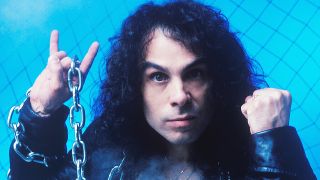“You know that expression: one door closes, another one opens?” asked Ronnie James Dio. “Well, that happened to me twice. I had the door slammed in my face first by Ritchie Blackmore, then by Tony Iommi. I decided I’d make damn sure it never happened again. And the way to make sure of that was to have my own thing going.”
It was October 1984 and Dio’s label, Phonogram, were throwing a lavish party for Ronnie and his band, who were in London on the latest leg of a gargantuan world tour. The first Dio album, Holy Diver, released in the summer of 1983, had been the third of three all-time classic albums he would appear on. But where the first two – Rainbow’s Rising and Black Sabbath’s Heaven And Hell – saw him fronting someone else’s bands, Holy Diver was Ronnie James Dio writ large.
At the party, I hadn’t been sure whether to approach him. The last time I had spoken to Ronnie had been four years before when I was Sabbath’s publicist. The Ronnie Dio I knew could be a frightening prospect. Charming and friendly in public, behind dressing room doors he could be a stress monster, barking orders and screaming into people’s faces.
In fairness, there were a lot of stress monsters around Sabbath in those days. Tony Iommi and Geezer Butler were so wrapped up in their own personal dramas that it was left to Dio to steer the ship – something he did fantastically, rescuing the band from the decline of the final Ozzy years. But it was a thankless task, and after two albums Ronnie walked out. Now, though, he seemed like a different man.
“I’m happier than I’ve ever been,” he revealed. “I’ve got a whole new life and career, in a band I consider my best friends. I’ve got a wonderful wife. What more could I ask for?”
It seemed too good to be true. It was. Behind the scenes, Dio the band was already beginning to fracture, riven by financial disputes, creative stalemate and the bitter truth behind what happens when a band becomes successful but feels only one member is receiving the credit – and the money. And while timing and fortune played their part in the success of Holy Diver, the main ingredients were the desire, determination and sheer bloody-mindedness of the man who gave the band their name.
Wendy Dio says her husband was always a leader, even as a child. “He had a band when he was 10 years old,” she says today. “He was a tough cookie. Ronnie might have been small, but he was always in control.”
In the case of his solo band, it was a case of needs must. When Dio left Black Sabbath, he was not a wealthy man. He and Wendy had bought a single-storey house in the middle-class Tarzana district of LA, which they shared with several cats and dogs. Now they would be forced to re-mortgage the property to fund Dio’s own project.
“We hadn’t made any money at all in Rainbow,” remembers Wendy. “We made a little bit of money in Sabbath and bought a house. But we mortgaged it because it was expensive to put something on the road. It was a risk. But I believed in him. He believed in himself.”
In the wake of the split with Sabbath, Wendy had become Ronnie’s manager. The pair were introduced in by Ritchie Blackmore, a friend of the Essex-born Wendy’s first husband, drummer Aynsley Dunbar. They became inseparable over the next few years and married in 1978. As a wife, Wendy had looked after Ronnie like a wolf mother protecting her cub. As a manager, she would become an attack dog.
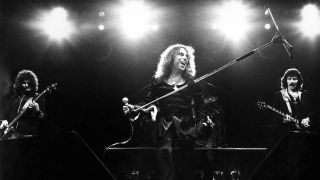
Ronnie had left Sabbath with another valuable asset: drummer Vinny Appice. The latter had joined during the tour for Heaven And Hell as stand-in for the drug-addled Bill Ward. When it became clear that Ward was not coming back, Appice stayed on for the second Dio-era Sabbath album, Mob Rules, and the subsequent live album, Live Evil. A pair of Italian Americans, Ronnie and Vinny bonded easily. In the summer of 1982, Dio took Appice for dinner and told him of his plans to leave Sabbath and start his own band. He asked Vinny if he wanted in.
“I said: ‘Yeah. Fuck yeah!’” says Appice today. “I was just a kid, but Ronnie was a great leader. I looked at him as a brother. I loved Tony and Geezer too – they asked me to stay, but it was just a lot easier to go with Ronnie and start something new.”
The two spent the next few weeks jamming in a small wooden shack at the back of Ronnie’s house: Vinny on drums, Ronnie on bass.
“He sat on a stool and he sang,” says Appice. “We had Holy Diver riffs floating around and a couple of other riffs. And we’d record it on cassette.”
They also began a search for a new guitarist. One of the first to apply was Jake E Lee, a 25-year-old hotshot playing in LA wannabes Rough Cutt, who Wendy was managing (Lee later claimed to have written the riff to Don’t Talk To Strangers, one of two Holy Diver tracks credited solely to Dio). But Ronnie was keen to make the band an international proposition.
“He liked the way British musicians thought,” says Wendy. “I think that’s why he wanted to have British players in the band.”
A visit to London to uncover new talent proved fruitless – Dio and Appice even ended up checking out the guitarist from a reggae band by mistake. Instead, it was Dio’s old Rainbow bandmate Jimmy Bain who helped complete the picture.
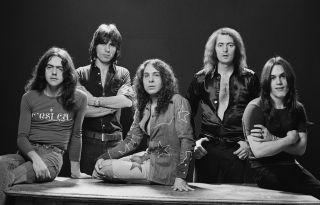
The 34-year-old Bain was a hard-living Scotsman whose petite frame belied his steely constitution. Following his time in Rainbow, the bassist put together Wild Horses with ex-Thin Lizzy guitarist Brian Robertson. Bain was finishing up some Wild Horses dates in Ireland when he got a call from Dio.
“It was out of the blue,” says Bain. “He said he’d left Sabbath and did I know of a guitar player?”
Dio later claimed that Bain had misunderstood his call – that he was simply asking if Bain knew of any good guitarists. “Jimmy took it on himself to bring his bass and kind of made the assumption he was in too,” said the singer.
According to Bain, there was no doubt in his mind as to what Dio was after. “The idea was to have two American and two British guys in a band,” he says. “I had two guys in mind. One was [former Thin Lizzy guitarist] John Sykes, who I thought was a little tall.”
The other was a 20-year-old kid from Northern Ireland named Vivian Campbell, whose band, Sweet Savage, had opened for Wild Horses. Bain had never actually heard Campbell play, although the bassist was aware of his reputation.
“I got a great vibe off the fans,” he says, “so I put his name forward. We arranged to meet at [London rehearsal studio] John Henry’s. The four of us got there, set up and played. It was just fucking magic.”
Vivian Campbell was asleep when he got the call about joining Dio. It was the middle of the night, and his father had woken him to say there was a drunken Scotsman on the phone. It was Bain, calling from a hotel room, with Dio and Appice in the background, asking him if he wanted to audition for “this wee band” in London the next day.
Campbell had been a member of Belfast-based NWOBHM-ites Sweet Savage since his mid-teens. The band had released a pair of well-received singles and supported Thin Lizzy and Ozzy Osbourne. Campbell was a fan of both Rainbow and Sabbath, though only the Dio-led incarnation of the latter.
“I didn’t like Sabbath with Ozzy,” says Campbell. “But I played the shit out of the Heaven And Hell album. To me, Dio was a big star.”
For Campbell, Bain’s offer was a no-brainer. His father sprang for the plane ticket and he flew to London the very next day with just his guitar in hand.
“We jammed on Holy Diver because Ronnie already had the song written,” Campbell recalls. “We played that over and over.” In an attempt to impress Dio, he ran through his “arsenal of flash guitar tricks”, but it was only when he reverted to basic rock’n’roll guitar licks that everything clicked. “Later, Ronnie played me the tape again and pointed out exactly when he decided I should be in the band. It was the stuff I played when I’d run out of ideas. He said: ‘That’s the shit! That’s when I knew you were the guy for me!’”
With Campbell on board, things moved fast. Within weeks the four of them were in LA, working at Sound City Studios in Van Nuys, a courtyard with a rehearsal room on one side and a recording studio on the other. Although Dio already had two songs written – Holy Diver and Don’t Talk To Strangers – the other tracks that would appear on their debut album were all concocted at these sessions.
It wasn’t all plain sailing for the inexperienced guitarist. With Ronnie and Vinny both married and living at home in LA, Vivian and Jimmy were forced to share a cheap two-bedroom apartment in the industrial wasteland of Oakwood, rented for them by Wendy and Ronnie. In a strange city, with no friends around him, Campbell felt lonely. Bain’s extra-curricular activities didn’t help.
“He used to bring people back to the apartment,” says Campbell. “They’d be freebasing on the kitchen table. I’d never seen anyone do cocaine, let alone melt it on a spoon over a can. I used to lock myself in my room. I’d get up in the morning and there’d be strangers laying around, wasted off their fucking tits.”
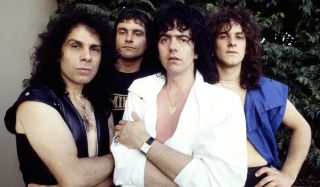
Bain’s party-hard lifestyle didn’t mask his own concerns with the set-up. The bassist knew Ronnie and Wendy from his days in Rainbow. “She was always murmuring in his ear: ‘You don’t need Ritchie, you can be out on your own, blah blah blah,’” he recalls. “She came along and started to be his voice.”
Bain claims that when he agreed to join Ronnie in his post-Sabbath venture, the band had no name, and the plan was to split the money equally among the founding members. But the bassist says he knew it was doomed “as soon as we got to LA and Wendy appeared on the scene as his manager. I could tell it was all about her and him and fuck everybody else.”
Such concerns were parked when the band entered Sound City at six o’clock every night. They’d rehearse in one room, then wheel the equipment across the parking lot to the studio to record. The material was a Frankenstein concoction of parts from older songs that Bain and Campbell brought to the table, the two tracks Dio and Appice had jammed on prior to going to London, and some artfully “thrown together” numbers recorded at the last minute. One such song became the album’s opener, Stand Up And Shout.
“That was a Jimmy riff,” says Campbell, “although he and I go back and forth on this because it was similar to an old Sweet Savage thing. But that was stolen from a Gary Moore riff, so it was six degrees of separation.”
The title track, credited solely to Ronnie, may also have been a ‘steal’, albeit an subconscious one. While his lyrics – about riding tigers and being ‘down too long in the midnight sea’, which were either a reference to Lucifer’s fall in the Book Of Revelations or entertaining mumbo jumbo, depending on your viewpoint – were entirely his own, its anthemic beat was reminiscent of Survivor’s Eye Of The Tiger, a huge hit at the time Ronnie and Vinny were jamming in the singer’s backyard. Even so, Bain insists that it was more of a collaboration that the credit suggests.
“The whole band made it into a song,” he says. “Ronnie was great at melodies but he could never have written that riff on his own.”
Certainly the album’s other centrepiece, Rainbow In The Dark, was a collaborative effort. The riff was taken from a Sweet Savage song called Lady Marianne.
“We played it for Ronnie and he immediately started singing the melody on top of it,” says Campbell. “And then Jimmy went over to this little Yamaha and came up with the keyboard motif. We had the fucking song written in 10 minutes.”
On the face of it, they worked well together. For the crunching Straight Through The Heart, Bain, Campbell and Appice knocked around one of the riffs the bassist had brought with him from Wild Horses, before Dio came in with the melody. The sound of the thundering Invisible was altogether more accidental.
“We had one of the riffs,” recalls Appice. “Then the next night we came in, we smoked a whole bunch of pot and our soundman put the tape in backwards. It started playing, and we all sat there laughing, going: ‘You asshole!’ But then we started saying: ‘Wait a minute, that sounds good!’ So we wound up learning the riff backwards. And that’s the other part of Invisible. It’s the riff forwards and the riffs backwards.
- The Top 10 most underrated Iron Maiden songs
- Rainbow Rising: how Ritchie Blackmore aimed for the stars
- What Really Happened On The Night Bon Scott Died?
But it wasn’t an entirely stress-free environment. “There was always a bit more tension in the roomcwhen Ronnie came to rehearsal,” says Campbell. “He was the boss. He’d bring the wages in every week and count it out for us in cash – then keep us rehearsing to the early hours of the morning, knowing we’d be in a hurry to go out to a club and spend it.”
Despite such issues, Holy Diver was a ready-made classic: a modern metal album that also harked back to Zeppelin, Lizzy and, of course, Rainbow.
“It’s one of the proudest things I’ve ever done,” said Ronnie when we spoke of it years later. “There were great songs and great playing too.”
But while things were going well musically, the seeds of the original line-up’s destruction were already being sown. For Bain, another sign that something wasn’t right came with the decision –taken unilaterally by Ronnie – to call the band Dio.
“I thought it was a shit name,” he says. “I’d rather have been called The Carpets than Dio.”
According to Wendy, the name was chosen for purely practical reasons. purely practical reasons. “Because Ronnie had a solo deal at the time, it was just easier to do it that way,” she says. “Also, with respect, it was Ronnie’s name that was gonna sell the album, and at the time the record company weren’t really behind us at all. We had to do whatever it took to make it happen. And if it worked, everybody would benefit.”
And work it did. Packaged in a typical early-80s metal cover, featuring a devil and a drowning priest, Holy Diver was released on May 25, 1983 to a standing ovation from both fans and media alike – more than can be said for the albums released the same year by Ronnie’s old bands Rainbow and Black Sabbath. Twelve months later it went gold in the US.
“We never knew it would do as well as it did,” says Wendy. “After all the things we’d gone through, the trials and tribulations, having no money, and then all of a sudden it was all happening, it was fantastic. Not ‘I told you so’, more ‘I showed you!’”
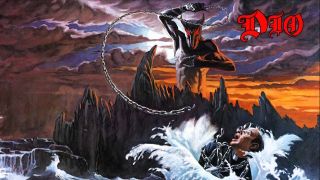
The first tour as Dio began in July 1983 at the 3,000-capacity Convert Barn in Antioch, California. “I’ll never forget it,” says Campbell. “Jimmy came over during Invisible and went to lean on me right as I turned away, and he fell off the stage. He didn’t miss a beat. He was down but not out.”
Actually, Bain was on the beginning of a huge downer. The oldest and most experienced of the three musicians recruited by Dio, he above all resented the lack of recognition he felt the band had received for their part in creating Holy Diver – not least from Ronnie and Wendy.
“I didn’t join the band as a hired hand, I was under the impression we were a proper band,” he says. “Ronnie was always in control, yes,” counters Wendy. “But we’d funded everything. They were on retainers, whether they worked or not. Plus they got all their publishing, which they still get to this day. But they don’t say any of that. Let’s put it this way: the band was called Dio. All those other people were unknown.”
When Ronnie flew to London to shoot videos for the tracks Holy Diver and Rainbow In The Dark, Bain flew back too, inviting Campbell to join him at his house in Richmond. The only problem was that the rest of the band weren’t supposed to be in the videos.
“The only reason Jimmy and I appear in Rainbow In The Dark is because we gatecrashed the video,” says Campbell. “It was Jimmy’s idea. He was bent out of shape. We drove to where they were shooting in Soho, had a pint, then we walked around. The director goes: ‘Great! You guys should be in the video!’ So they sent out for some instruments. Needless to say, Ronnie wasn’t too chuffed, but we thought, fuck it. He didn’t say anything, he just gave us that look.”
For all their problems, the first Dio line-up soldiered on through another two albums – 1984’s The Last In Line and 1985’s Sacred Heart – although Campbell and Bain were becoming more vocal in their discontent. There were no fisticuffs, no real shouting matches, but the seeds that had been sown during the making of Holy Diver would bear fruit. According to Campbell, it all went back to Ronnie reneging on his promise that Dio would be a band of equal parts, rather than his backing group.
“Ronnie had said when we were making Holy Diver: ‘Obviously it’s going to be my band that I’m bankrolling, so I’m taking all the coin, but by the third album we’re gonna make this an equitable situation,’” says the guitarist. “That’s what got me fired, because I was a thorn in his side about that. I kept reminding him. Ronnie became like an angry dad. We weren’t comfortable around each other any more.”
Campbell left Dio in early 1986 after a dispute over a contract. Jimmy Bain, despite his issues with the way things were run, would remain a member of Dio until 1990, and even return for a second stint from 1999 to 2004. Vinny Appice, Dio’s ever-loyal lieutenant, would bail at the same time as Bain, and similarly return to the fold between 1993 and 1998 (he played drums alongside the singer in Heaven & Hell).
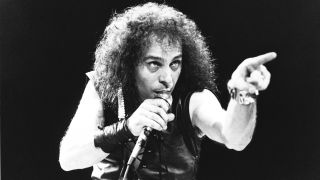
There’s no doubt Dio had his hang-ups. He was touchy about his height and his age. And, as Jimmy Bain points out, he had issues with the past.
“He always had a bit of a hard-on about the fact he worked with Ritchie Blackmore and Tony Iommi, guitar players who had led the band that he was just the singer for, and that he would do things his way once he got the chance,” says Bain. “I just didn’t know he would almost mimic them.”
“They say they wrote all the songs,” counters Wendy Dio. “They all brought riffs and pieces of music to Ronnie that then became a song. It does make me a little angry because Ronnie was fair to them. They wanted to be an equal band member and get the same money as Ronnie. And I’m sorry, but I said no to that. Ronnie got all the shit for it but I’m the bad guy. Ronnie probably would have done it.”
The bad blood worsened while he was still alive, and still hadn’t fully subsided by the time of his death in May 2010. But the cussedness that in part caused the problems also provided Ronnie with his greatest strength: his determination to succeed, whatever the odds stacked against him.
“Ronnie was a grafter,” says Campbell. “I found him intimidating. And no, I still don’t feel we got a fair shake of the stick when it came to the money or, later, the music. But he was a fantastic fucking singer and Holy Diver is still a fantastic fucking album. And I’m proud to say I helped make it with him. We all are.”
This article originally appeared in Classic Rock 185
